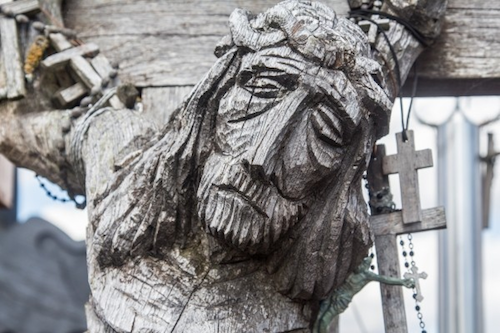We run our website the way we wished the whole internet worked: we provide high quality original content with no ads. We are funded solely by your direct support. Please consider supporting this project.

Do the Gospels Fabricate Prophetic Fulfillment?
Skeptically-inclined scholars, and especially critics of Christianity, frequently argue that the Gospel authors created mythological portraits of Jesus largely on the basis of OT material they claim Jesus “fulfilled.” In other words, they surveyed the OT and fabricated stories about how Jesus fulfilled those prophecies. In response, it’s hard to deny that there are certain narratives in which it seems Gospel authors may in fact be doing this. In the previous post, I discussed how Matthew apparently revised some of the details about Jesus’ entrance into Jerusalem to make it conform to the Septuagint. This is a classic case in point. It seems we must thus grant that the conviction held by the NT writers that everything in the OT must find its fulfillment in Christ sometimes motivated these authors to rework details of the Jesus story to conform to OT material.
Having granted this much, I must add that, as a general explanation of how the Gospel writers developed the portrait of Jesus, the fabrication theory faces massive problems. Beyond the many considerations that support the general historical reliability of these documents, (See Lord or Legend) if the Gospel authors were fabricating portraits of Jesus on the basis of OT material, wouldn’t they have constructed a portrait that conformed to this material much more literally? If the Jesus of the Gospels is created from the OT texts he fulfills, in other words, why does he fulfill some of these texts so awkwardly?
Let me illustrate. Consider John’s interpretation of the guards’ response to Jesus’ request for something to drink while hanging on the cross. They placed a sponge dipped in “wine vinegar” on “a stalk of the hyssop plant, and lifted it to Jesus’ lips.” This, John says, was done “so that Scripture would be fulfilled” (Jn. 19:28-29). The passage these guards “fulfilled” was Psalm 69:21 in which the Psalmist complains that his enemies “give me poison (ro’sh) for food” and “offer me sour wine for my thirst” (NLT). Now, if anyone is inclined to think that Jesus had to ask for something to drink and that the guards had to respond the way they did in order to “fulfill” this verse, as conservative Christians apologists frequently do, they’d have to explain how it is that the second half of this passage had to be fulfilled while the first half did not, for we have no account of anyone trying to poison Jesus.
If the Jesus of John’s Gospel is fabricated by John from OT material, why would he fabricate a narrative that depicts Jesus being offered sour wine to fulfill the second half of Psalms 69:21 but that lacks anyone trying to poison Jesus to fulfill the first half of this passage? In reality, there is nothing predictive about this passage, and so neither Jesus nor the guards had to act the way they did. What is going on instead is that John is interpreting the OT in an intensely Christocentric way. He is convinced that Jesus brings God’s dealings with Israel throughout the OT to a climatic fulfillment, and so any aspect of Jesus’ life that in any way has a parallel in the OT is seized as a “fulfillment” of that parallel. Even so, we must admit that it’s rather awkward. The fact that John could site the second half of a verse while ignoring the first half simply reveals just how intensely he and other early followers of Jesus combed through the OT to find confirmations of their Christocentric conviction.
The very fact that the Jesus portrayed in the four Gospels often fulfills OT passages so awkwardly strikes me as strong evidence that they were not creating a portrait of Jesus on the basis of these passages but are rather striving to find new meaning in these OT passages on the basis of a historical Jesus. If John believed that Jesus actually asked for something to drink and was offered sour wine, for example, I can understand why he would infuse the second half of Psalm 69:21 with Christological significance while ignoring the first half. But his selective use of this and many other passages makes no sense on the supposition that he was fabricating a portrait of Jesus on the basis of this and other passages.
In any event, the most significant point to note concerning the often-awkward way the Gospel authors weave OT passages and themes into their various portraits of Christ is that it reflects a remarkably intense Christocentric interpretation where the passages’ meaning was acquired in the light of Christ.
Photo via Visual Hunt
Category: General
Tags: Cross, Cruciform Theology, Jesus, Old Testament, Prophesy
Topics: Biblical Interpretation, Christology
Related Reading

Christ-Centered or Cross-Centered?
The Christocentric Movement Thanks largely to the work of Karl Barth, we have over the last half-century witnessed an increasing number of theologians advocating some form of a Christ-centered (or, to use a fancier theological term, a “Christocentric”) theology. Never has this Christocentric clamor a been louder than right now. There are a plethora of…

Do We Read Bible-Violence to Children? (podcast)
Greg on children and Bible violence. Episode 658 http://traffic.libsyn.com/askgregboyd/Episode_0658.mp3

Cruciform Theology in Four Steps
The culmination of the biblical narrative of the cross reframes everything about who God is, what it means to have faith in God, and how we read the Bible! The entire Old Testament leading up to the crucified Christ must be interpreted with a view toward discerning how it anticipates and points toward this definitive…

The Extremity of God’s Love
In response to questions he has received about whether Jesus was actually separated from the Father on the cross, Greg fleshes out his perspective on this. The love that unites the Trinity is the very same love that resulted in the separation of the Father from the Son. This separation actually expresses the great love…

Aslan Roars: The Atonement as Spiritual Warfare
Greg begins to unpack the Christus Victor view of the atonement by comparing it to the Chronicles of Narnia.

The Most Beautiful Truth
Jesus was God incarnate. Yet he continually referred to, and prayed to, God the Father as someone who was distinct from himself. He also continually referred to, and claimed to be empowered by, God the Holy Spirit as someone distinct from himself. And yet Jesus, along with all Jews of his time, believed there is…
